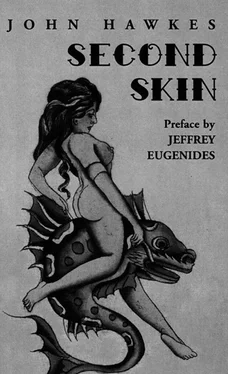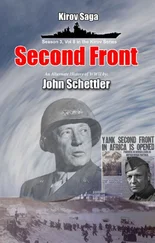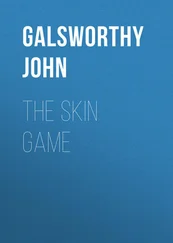Because I had heard a sound. Cassandra’s sleeping head lay in my lap — high upturned navy blue collar of the pea jacket revealing only the briefest profile of her worn and lovely little deathmask face — because I was awake and had heard a sound and recognized it. And because suddenly that impossible sound established place, established the hour, explained the tangled bright loops of barbed wire that apparently ran for miles atop the steep rise of our protective sand embankment. I listened, gently pressed the rough collar to her cheek, shivered as I understood suddenly that the wire was not for Indians, not to imprison cows. Listened. And still the impossible sound came to me over the wastes and distant reaches of the blue desert.
Bugle. This mournful barely audible precision of the instrument held rigidly in only a single hand. An Army bugle. Taps. Across the desert the faint and stately and ludicrous sound of taps. Insane song of the forties. And slow, precise, each silvery dim note dragged all the way to the next, the various notes weaving and wafting the sentimental messages into the night air. End of the day — who’s listening? who? — and of course lights out. But I listened to the far-away musical moon-howling of that benediction into a dusty P.A. system built on the sands, with a few stomach convulsions heard the final drawn-out bars of that impersonal cinematic burial song meant for me, for every bald-headed indoctrinated man my age. Taps for another bad dream. Brass bugle blown in the desert, a little spit shaken out on the bugler’s sleeve.
So I knew that it was eleven o’clock of a hot-cold desert night and that we had come to stop not in the middle of nowhere but at the edge of some sort of military reservation — cavalry post of black horses that would explain the odor of dung on the wind? basic training camp with tequila in the PX and live ammunition on maneuvers? naval boot camp for special instruction in flying the blimp and dirigible? — and knew that whatever I had to guard Cassandra against it was not the Mexicans.
But now I was awake, alert, ready for anything. Hunching over my own daughter and my own granddaughter — outlandish bundles of pea jackets, flesh of my flesh — I became the solitary sentry with quick eyes for every shadow and a mass of moonlit veins scurrying across my naked scalp like worms. Fear and preparedness. Aching joints. Lap beginning to complain. But on the tail of the bugle and also miles away, several unmistakable bursts from a rapid-fire weapon. And I looked for a glow in the sky and tried to imagine the targets — cardboard silhouettes of men? gophers? antiquated armored vehicles? — and I listened and wondered when they would begin to shoot in our direction. Army camp, disabled bus, poor nomad strangers wandering through days and nights and hours that could be located on any cheap drugstore calendar: I took a deep breath, I stiffened my heavy jaw, I waited. In anger I heard a few more snorts of machine gun fire, in anger I nodded once more at the image of Tremlow the mutineer, in anger snapped myself awake.
“Cassandra,” whispering, leaning close to her, lifting enormous collar away from her ear, touching the cold cheek, sweating and whispering, “wake up, Cassandra. We’ve got company. …”
Her open eyes, her rigid face and body, the quiver in the breasts and hips, and the outstretched rumpled figure was suddenly alert, half sitting up. And then she had thrust Pixie away, had hidden Pixie in a shadow on the sand. And then side by side Cassandra and I were kneeling together on our hands and knees, waiting with heads raised and red-rimmed eyes fixed on the barbed wire barricade directly above us.
“Men traveling on their bellies,” I whispered. “Three of them. Crawling up the embankment to reconnoiter! ” We heard the swishing sound of men pressed flat to the desert and, like children making angels in snow, swimming up the steep embankment through loose sand and pebbles and low-lying dried and prickling vines. We heard their concentrated breathing and the tinkling sound of equipment. I recognized the flat fall of carbine with each swing of invisible arm, recognized the uneven sound of a bayonet drumming on empty canteen with each dragging motion of invisible haunch. Then a grunt. Then squeal and scurry of little desert animal diving for cover. Then silence.
And then the heads. Three black silhouettes of helmeted heads suddenly there behind the wire where before there had been only the barbs, the loops, the tight strands and the velvet space and salt and pepper heavens of the whole night sky. But now the heads. All at once the three of them in a row. Unmoving. Pop-ups in a shooting gallery.
And as Cassandra and I knelt side by side in the sand, stiff and exposed and red-eyed in our animal positions, together and quiet but vulnerable, the three heads began to move in unison, turned slowly, imperceptibly, to the right and then to the left, in unison scanning the horizon and measuring the potential of the scene before them. The tops of the heavy helmets and the tips of the chin cups reflected the moon; in the sharp little faces the eyes were white. Soldiers. Raiders. Pleased with the scene. Their whispers were high, dry, choked with sand.
“Lucky, lucky, lucky! Ain’t that a sweet sight?”
“Navy to the rescue!”
“Free ride on a Greyhound bus!”
The three of them looked straight ahead — intuitively I knew the driver was still throwing his wrenches into the air, still trying to boss the tire into place, and I groaned — and then in slow motion they began to shift. The heads sank down until the men were only turtle shells and hardly visible on the embankment; the muzzles of two carbines popped into view; the man in the center raised his helmeted head and his white hand and a pair of wire cutters, slipped and tugged and twisted while the wire sang past his face and curled into tight thorny balls. Until they could crawl through. Until they were free.
And then with heads down, shoulders down, rifles balanced horizontally in their hanging hands, they swung in a silent dark green trio over the embankment and down, down, like baseball players hitting the sand and landing not on top of Cassandra and myself but in front of us and to either side. Three sand geysers and Cassandra and I were trapped.
“Company C,” panting, whispering, “Company C for Cain,” panting and aiming his gun and whispering, “Don’t you make a peep, you hear? Either one of you!”
Three small soldiers in full battle pack and sprawled in the sand, gasping, leaning on their elbows, cradling the carbines, staring us down with their white eyes. Web belts and straps, brass buckles, cactus-green fatigue uniforms — name tags ripped off the pockets — paratrooper boots dark brown with oil; they lay there like three deadly lizards waiting to strike, and all of their vicious, yet somehow timorous, white eyes began blinking at once. The middle soldier, the leader, wore a coal-black fingernail mustache and carried his bayonet fixed in place on the end of his carbine. All little tight tendons and daggers and hand grenades and flashing bright points and lizard eyes. Unscrupulous. Disguised in soot. Not to be trusted in a charge.
“Company C for Cain, like I said. But we been in that place for twenty-eight weeks and now we’re AWOL. The three of us here are called the Kissin’ Bandits and we’re AWOL. Understand?”
And the smallest, young and innocent except for his big broken Brooklyn nose — my ghetto Pinocchio — and except for the foam which he kept licking from the corners of his mouth and swallowing, the smallest twitching there in the sand and prodding each word with his carbine and with his nose: “So on your feet, on your feet. No talking, and don’t forget the kid.”
Slowly, laboriously, indignantly I stood up, helped Cassandra, brushed the seat of my trousers, jerked the creases out of my uniform as best I could, indifferently picked off the cactus burrs, and took little Pixie into my arms.
Читать дальше












